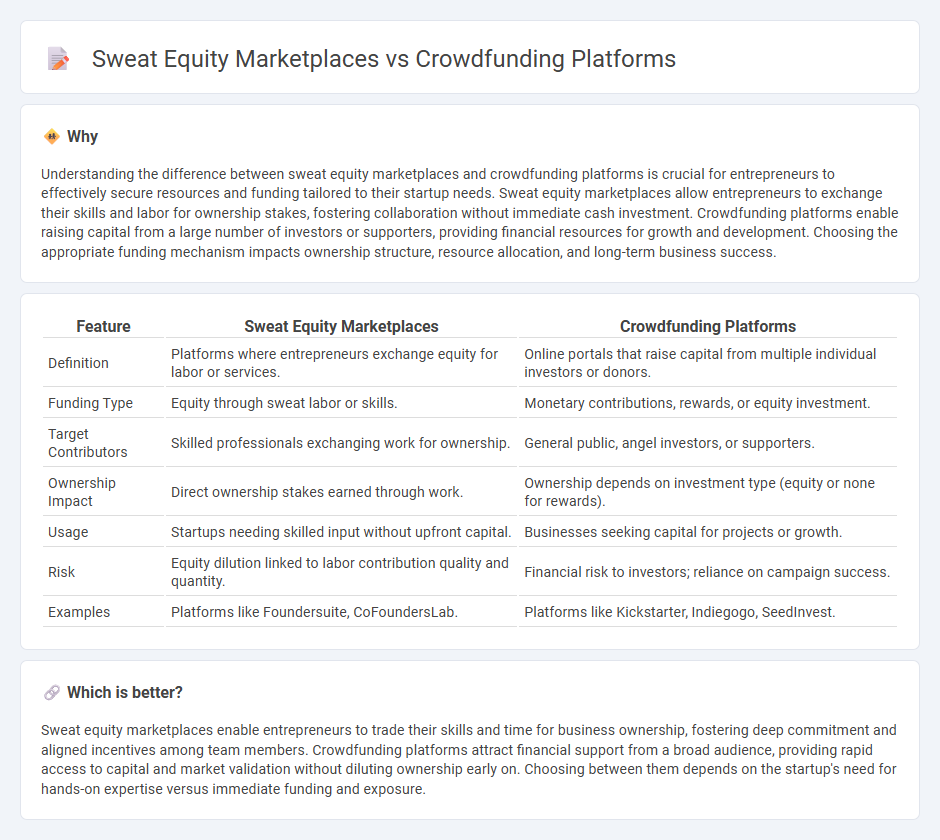
Sweat equity marketplaces and crowdfunding platforms both serve as innovative funding sources for startups, with sweat equity focusing on contributors exchanging labor or expertise for ownership stakes, while crowdfunding primarily involves raising capital from a broad base of individual investors. Sweat equity enables entrepreneurs to build teams driven by shared commitment and skills without immediate financial outlay, whereas crowdfunding taps into diverse investor networks to generate the necessary funds for growth and product development. Explore how leveraging these distinct models can accelerate your entrepreneurial journey and maximize business potential.
Why it is important
Understanding the difference between sweat equity marketplaces and crowdfunding platforms is crucial for entrepreneurs to effectively secure resources and funding tailored to their startup needs. Sweat equity marketplaces allow entrepreneurs to exchange their skills and labor for ownership stakes, fostering collaboration without immediate cash investment. Crowdfunding platforms enable raising capital from a large number of investors or supporters, providing financial resources for growth and development. Choosing the appropriate funding mechanism impacts ownership structure, resource allocation, and long-term business success.
Comparison Table
| Feature | Sweat Equity Marketplaces | Crowdfunding Platforms |
|---|---|---|
| Definition | Platforms where entrepreneurs exchange equity for labor or services. | Online portals that raise capital from multiple individual investors or donors. |
| Funding Type | Equity through sweat labor or skills. | Monetary contributions, rewards, or equity investment. |
| Target Contributors | Skilled professionals exchanging work for ownership. | General public, angel investors, or supporters. |
| Ownership Impact | Direct ownership stakes earned through work. | Ownership depends on investment type (equity or none for rewards). |
| Usage | Startups needing skilled input without upfront capital. | Businesses seeking capital for projects or growth. |
| Risk | Equity dilution linked to labor contribution quality and quantity. | Financial risk to investors; reliance on campaign success. |
| Examples | Platforms like Foundersuite, CoFoundersLab. | Platforms like Kickstarter, Indiegogo, SeedInvest. |
Which is better?
Sweat equity marketplaces enable entrepreneurs to trade their skills and time for business ownership, fostering deep commitment and aligned incentives among team members. Crowdfunding platforms attract financial support from a broad audience, providing rapid access to capital and market validation without diluting ownership early on. Choosing between them depends on the startup's need for hands-on expertise versus immediate funding and exposure.
Connection
Sweat equity marketplaces and crowdfunding platforms are interconnected as they both enable entrepreneurs to raise capital and resources by leveraging community support and non-traditional funding methods. Sweat equity allows contributors to invest time and skills instead of money, while crowdfunding platforms provide a structured way to gather small financial contributions from a broad audience. This synergy fosters an inclusive entrepreneurial ecosystem where startups access diverse forms of equity and funding to scale and innovate.
Key Terms
Crowdfunding platforms:
Crowdfunding platforms facilitate funding by pooling small contributions from a large audience, often through online portals like Kickstarter, Indiegogo, or GoFundMe, making them ideal for startups and creative projects seeking capital. These platforms provide visibility and marketing benefits, allowing entrepreneurs to reach a broad network of potential backers without giving up equity. Explore more to understand how crowdfunding can accelerate your project's financing and community engagement.
Backers
Crowdfunding platforms enable backers to invest small amounts of money in projects, receiving rewards or equity in return, which fosters financial participation without direct involvement in operations. Sweat equity marketplaces offer backers an opportunity to contribute skills and labor instead of cash, earning ownership stakes through active contribution and increasing project value. Explore how these models empower backers to support ventures in distinct ways and choose the best fit for your involvement.
Funding goal
Crowdfunding platforms primarily focus on securing financial contributions from a wide pool of backers to meet a specific funding goal within a set timeframe. Sweat equity marketplaces emphasize exchanging labor and expertise for ownership stakes, often bypassing traditional cash funding requirements. Explore the distinct mechanisms and benefits of each model to determine the best fit for your project's funding strategy.
Source and External Links
10 Best Crowdfunding Sites and Platforms in 2025 - Shopify - Indiegogo is highlighted as a top platform offering flexible funding options with a 5% fee plus transaction costs, supporting businesses, artists, and nonprofits with ongoing fundraising features.
How to Choose the Best Crowdfunding Website for Your Next ... - GoFundMe is emphasized for personal fundraising, with no starting fee, a 2.9% + $0.30 transaction fee, and a large global community; it also offers GoFundMe Pro for nonprofits with tailored pricing.
Top 10 US Crowdfunding Platforms (Reward and Equity) - Kickstarter and Indiegogo dominate the US reward crowdfunding market with Kickstarter having a higher project success rate and Indiegogo allowing flexible funding; Patreon is noted for ongoing artist and creator support with tier-based fees.
 dowidth.com
dowidth.com